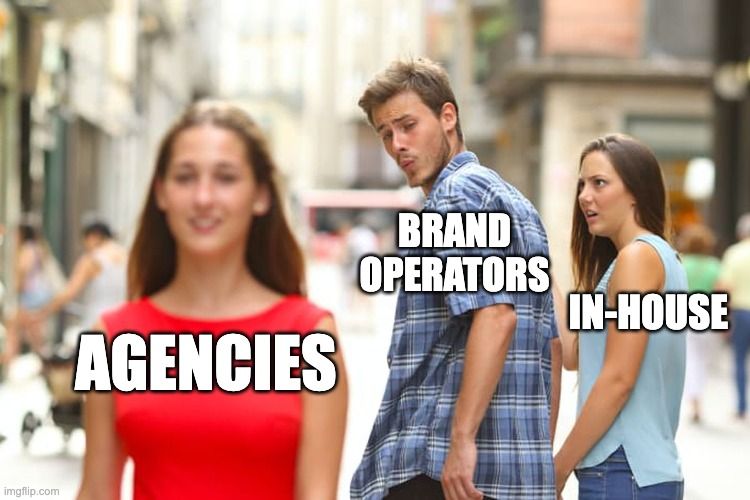If you haven't watched this video yet by Optmyzr's Fred Vallaeys, interviewing Google Ads Liaison Ginny Marvin, then you need to go check it out now (start at 23:50 for this article's topic!).
Well, if you're into digital marketing and PPC... if not, then let me share one interesting revelation coming from this video that I haven't heard anyone else talk about yet... that I'm curious to "double click" into!
That is, I want to talk about whatever the heck "synthetic keywords" are!
What is a Synthetic Keyword?
Your guess is as good as mine based on this video, and Ginny certainly doesn't offer much for response here at all other than to acknowledge the existence of the term. The real interesting thing is Fred's guess at what they are, and I'll make my own conjectures and ponderings on that as well.
To my best understanding, a "synthetic keyword" is Google's topical summary of a more conversational and detailed search in Gemini (and/or? AIO?).
To be clear, Synthetic Keywords were not in the GML keynote, but I think are a hint at how Google is beginning to work on striking the balance between giving advertiser's "search terms", while also maintaining the privacy of the individual searcher.
Now, someone may object to this and roll their eyes at the idea of "privacy" being brought in (I'll defend the eye roller by saying Google has given us opportunity for distrust in their handling of "other search terms" and lack of clarifying information there as to why 70% of some accounts have hidden search terms for """privacy""" reasons... but I digress)... but I actually think this is an incredibly valid concern for Google.
Think about it, LLMs and conversational interaction with a non-human is a completely new concept in all of human history.
Like, what the heck, there are a lot of landmines to navigate that we don't even know yet, so it makes sense that some initial pondering needs to be done by LLM platforms on potential consequences to their own revenue and to humanity (this is actually a big part of why the rapid growth and AI Arms Race concerns me... messing with world changing technology without fully understanding the consequences has very real concerns... i.e., when, and how, will the Chernobyl of AI happen? ...but I digress again...).
Think about it like this, let's say you had an entire threaded conversation about specifics of your 8 year old child's physical malady and potential solutions and health options... do you really want that entire thread in some advertiser's query report somewhere? Especially if it's next to all of your other threads that personally identifies you, you children, location, and everything else you hold dear? Surely we can agree that at some level, a slamming of the brakes needs to occur as all of this is processed.
So, in that sense, this is exactly why some sort of "keyword" is given to the advertiser without revealing private information from that extended conversation. As Fred notes in the video, Google bidding is still largely based on the keyword in Search so there is still the need for some level of reporting done here.
Of course, this is where the questions begin, which I can only conjecture are part of what Google is asking. How does one group synthetic keywords for instance, if the conversational summary happens to match other conversations that were kind of but not really the same? I guess that would be the same as our current "short tail" search terms... if someone types in "tacos near me" they could either be looking for a deal on Toyota Tacomas (commonly referred to as tacos in the car world, you're welcome fellow car people) or ahi tacos, or local tacos, or Taco Bell (shudder). Silly example, but we already have queries meaning different things, so in my opinion, synthetic keywords would unavoidably have that same behavior.
How do you actually define a Conversational Query?
Can we ponder conversational queries themselves for a second?
Really stop and think about this, and the challenge OpenAI, Google, and the rest of the LLMs have in reworking the nature of search.
Like, what is a search anymore within an LLM?
How do you define an individual "synthetic keyword" from a complex, ongoing conversation within the Gemini UI that meanders across various topics?
There are so many layers to this, that initially I won't try to solve them, but to more throw it out to the world... this stuff really is complex and I think we're all kind of figuring it out together, LLM engineers, advertisers, consumers, etc.
Whatever the answer is, surely we can pause to accept the fact that we all might have more questions than answers at this point.
Words. Still. Matter.
I'd like to close out this article by defending language. I like words. Words are a way to communicate our intentions, interests, desires, and emotions. Words help us reveal our identities to those around us. Words are pointless if you can't understand them, but curiously, words are not the only way to learn about someone's interests, intent, desires, and behaviors. The term "non-verbal" communication literally means that you are communicating these thigns without words.
So, let's take this into the realm of search: words matter, but are certainly not the ONLY way to communicate. Audiences, interests, demographics, behavior, etc are all helpful targeting signals that Google has hammered into our brains matter. Totally agree with this.
...but...
Words still matter. Brad Geddes and I were talking about this last week after GML was over, and perhaps it's just because we're both a little old school (him with far deeper experience than me), but I do hope Google never loses sight of the fact that a person's voiced/typed intention in the form of words, should remain the cornerstone of a search (whether conversational or not) experience.
How words are summarized (synthetically, even), or supported by additional signals is a key part of the brilliance of the Google machine. But, in defense of the search term and keyword, even conversational search is still, well, words.
As I've written before, until such point when we as a society move to emojis or fully "A Quiet Place" non-verbal communication... the word matters, carries significant intent, and should continue to be a primary bidding signal for search advertisers.
EDIT: Well looky here, in 2013, SEO guru Bill Slawski wrote about a Google Patent for Synthetic Queries... which appears to be different, but also similar to this idea of taking root "queries" (the conversation) and generating a synthetic query from that. Okay, so... plot twist... does this mean Google OWNS THE PATENT on sythetic keywords/queries??? IDK, cause I'm not a lawyer, but this is pretty interesting! Google's Patent on Synthetic Queries.

.png)
.webp)


.jpeg)

.jpg)




